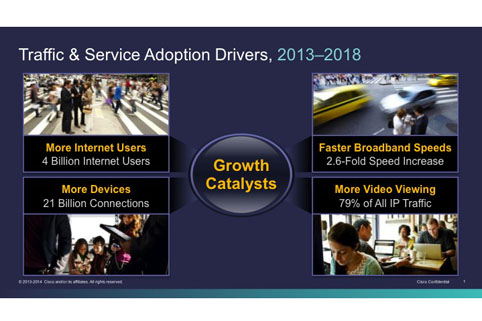
Global Internet Protocol (IP) traffic will increase nearly three-fold over the next five years due to more internet users and devices, faster broadband speeds and more video viewing, reports Cisco.
The Cisco Visual Networking Index Global Forecast and Service Adoption report for 2013 to 2018 predicts that IP traffic for fixed and mobile connections is expected to reach an annual run rate of 1.6 zettabytes* – more than one and a half trillion gigabytes per year by 2018. The projected annual IP traffic for 2018 will be greater than all IP traffic that has been generated globally from 1984 – 2013 (1.3 zettabytes).
The Middle East and Africa (MEA) region will continue to be the fastest growing IP traffic region from 2013 – 2018 with a five-fold growth and a 38% compound annual growth rate (CAGR).
Mobile and portable devices other than PCs will drive the majority of traffic by 2018. In 2013, 33% of IP traffic originated with non-PC devices, however, by 2018, the non-PC share of IP traffic will grow to 57%. PC-originated traffic will grow at a 10% CAGR, while other devices/connections will have higher traffic growth rates over the forecast period including TVs (18%), tablets (74%), smartphones (64%) and machine-to-machine connections (84%).
Wi-Fi and mobile-connected devices will generate 61% of IP traffic by 2018. Wi-Fi will be 49% and cellular will be 12%. Fixed traffic will be only 39% of total IP traffic by 2018. In comparison, Wi-Fi was 41%; cellular was 3%; and fixed was 56% in 2013.
Wi-Fi and mobile-connected devices will generate 76% of internet traffic by 2018, Wi-Fi will be 61% and cellular will be 15%. Fixed traffic will be only 24% of total internet traffic by 2018. In comparison, Wi-Fi was 55%; cellular was 4%; and fixed was 41% in 2013.
With the FIFA World Cup 2014 already in full swing, millions of people are expected to view games and/or highlights via the internet. Video streaming and IP broadcast of the World Cup is anticipated to generate 4.3 exabytes of IP traffic, which is three times the amount of monthly IP traffic currently generated by Brazil (this year’s World Cup host city). In addition, internet traffic generated by the 60,000 people in a stadium and travelling to games is forecasted to surpass the busy-hour** traffic from all 94 million smartphone subscribers in Brazil.
Global IP traffic is expected to reach 132 exabytes per month by 2018, which is the equivalent to:
• 8.8 billion screens streaming the FIFA World Cup final game in Ultra-HD/4K at the same time;
• 5.5 billion people binge-watching Game of Thrones Season 4 via video-on-demand in HD or 1.5 billion watching in Ultra-HD/4K;
• 4.5 trillion YouTube clips; and
• 940 quadrillion text messages.
*A zettabyte is equal to 1,000 exabytes and precedes the yottabyte unit of measurement.
** Busy-hour is a 60-minute period with the maximum total traffic load in a given 24-hour period.
This story also appears on IBC’s Content Everywhere.





